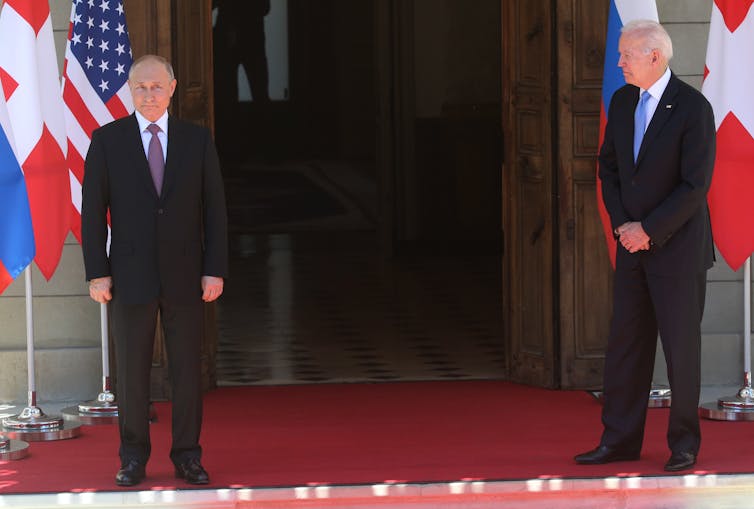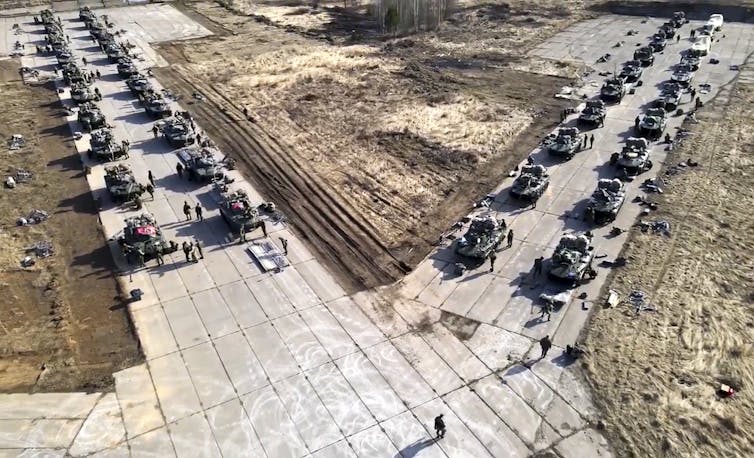How Vladimir Putin uses natural gas to exert Russian influence and punish his enemies
- Written by Lena Surzhko Harned, Assistant Teaching Professor of Political Science, Penn State
The recent U.S.-Russia summit between Presidents Joe Biden and Vladimir Putin suggests that a controversial Russian natural gas pipeline, Nord Stream 2[1], is a done deal.
If completed as planned by the end of this year[2], Nord Stream 2 will convey 55 billion cubic meters of gas per year from Russia to Germany via the Baltic Sea and thence to the rest of Europe. It is expected to bring US$3.2 billion[3] to Russia annually.
Construction had been halted for over a year by U.S. sanctions passed in 2019 on the pipeline’s construction and financing. Sanctions were later expanded in 2020[4]. Some Russia experts[5] expected those sanctions to be a bargaining chip for Biden at the recent Geneva summit to pressure Putin[6] over Russian occupation of territories in Ukraine and Georgia; support for Belarus’ dictatorial regime[7]; violation of human rights within Russia; and the poisoning, jailing[8] and outlawing of political opposition[9].
Instead, a month before the summit, the White House[10] lifted sanctions on Nord Stream 2, dismaying some U.S. legislators[11] and U.S. partners[12] in Europe[13].
The pipeline project is a joint venture between[14] a handful of European gas companies and Russian giant Gazprom, a majority state-owned company that is the largest gas supplier in the world. For Putin, the pipeline is an opportunity to increase his influence in Europe by deepening the region’s dependence on Russian energy.
Natural gas has been the bedrock of Putin’s power both domestically[15] and internationally[16] for decades. Nord Stream 2 gives the Russian leader a new direct and powerful line of control in Western Europe.
 Biden and Putin had a tense if cordial meeting in Geneva.
Mikhail Svetlov/Getty Images News via Getty Images[17]
Biden and Putin had a tense if cordial meeting in Geneva.
Mikhail Svetlov/Getty Images News via Getty Images[17]
How Putin controls Russian oil
Since taking office in 2000, Putin began seizing control of the Russian gas and oil industry. He renationalized Gazprom[18], the state oil company that had been privatized after the fall of the Soviet Union.
Scholarly research has demonstrated that regaining government control over the gas and oil industry[19] contributed to consolidation of authoritarianism[20] in Russia. And it coincided with crackdowns on Putin’s political opposition.
In 2003 Mikhail Khodorkovsky, owner of the Yukos oil company and a vocal critic of Putin’s growing authoritarianism[21], became the regime’s first famous political prisoner, after he was arrested at gunpoint and imprisoned for 10 years for tax evasion. Yukos was eventually seized by the government and absorbed into the state-owned companies.
By the end of his first term in office in 2004, Putin’s government had significant control over oil and gas production in Russia, which is the one of largest producers and exporters in the world[22]. Proceeds collected from oil and gas sales allowed Putin to pay for his domestic agenda and boost military spending. It also gave him extraordinary leverage[23] over neighboring countries that relied on Russia for their energy needs.
For example, in 2006 and 2009[24], when the Ukrainian government adopted more pro-Western policies and upset the Kremlin, Russia outright shut off the country’s gas supply[25] – and by extension, shut off the gas of countries down the supply line in Central and Western Europe, including Germany.
Russia versus Europe
As a direct line of supply from Russia to Europe, Nord Stream 2 could avoid such problems for Western Europe in the future. But it also opens Western Europe to the same kind of direct Russian pressure[26] it has used to punish Ukraine. So the proposed pipeline has been divisive.
Nord Stream 2 has already produced a rift between NATO allies[27], even before its completion.
Sweden, Poland and the Baltic countries, for example, have all raised concerns[28], citing environmental problems related to construction and maintenance of the pipeline. They worry that Russia will use its new pipeline infrastructure to increase its military naval presence in the Baltic Sea. That would increase Russia’s intelligence-gathering capacity.
Further “crumbling NATO[29],” as Putin puts it – sowing divisions in the alliance – would be a win for his regime.
The Russian leader sees NATO, which he calls a Cold War relic, as the greatest threat to Russian security. Disunity in Europe allows Russia to continue pursuing political repression of its own citizens and territorial aggression against neighboring nations with less foreign interference.
Ukraine’s dilemma
For Ukraine, Nord Stream 2 presents both a security and financial threat.
Ukraine largely stopped buying gas from Russia[30] in 2015 following Russia’s 2014 annexation[31] of the Ukrainian territory of Crimea and support for a still-deadly Russian-sponsored separatist war in Donbas[32], in eastern Ukraine.
 A Russian military drill in April 2021 in Crimea, a former territory of Ukraine that was annexed by Russia in 2014.
AP Photo/Russian Defense Ministry Press Service[33]
A Russian military drill in April 2021 in Crimea, a former territory of Ukraine that was annexed by Russia in 2014.
AP Photo/Russian Defense Ministry Press Service[33]
However, Ukraine still collects up to US$3 billion in annual fees[34] because Russian gas currently runs through a pipeline in Ukrainian territory to get to Europe.
Nord Stream 2 will deprive Ukraine of this income. According to Ukraine President Volodymyr Zelensky, the money lost in gas transit fees will mean Ukraine will have “nothing to pay for the Ukrainian army[35]” to defend Ukraine from further Russian aggression.
In April 2021, observers documented a build-up of Russian military[36] at Ukraine’s border with Russia, as well as in the waters of the Black Sea and the Sea of Azov. The Russian military pulled back after a few weeks[37], but there is evidence that some 80,000 Russian troops remain near Ukraine, along with military equipment[38], including trucks and armored vehicles.
Zelensky says the pipeline has become a “real weapon[39]” against Ukraine. In Kyiv, fears are that once Russia stops relying on Ukraine for transit to Europe, Putin will begin to exert more pressure[40] on the Ukrainian government[41] over the warring Donbas region or resume military aggression.
The risk may not be worth the reward of cheaper gas prices[42] for European consumers. The economic boost that Russia will likely receive from capturing the European gas market will further enrich Putin’s kleptocratic regime – and, history shows, finance his undemocratic projects in Eastern Europe and beyond.
[The Conversation’s most important politics headlines, in our Politics Weekly newsletter[43].]
References
- ^ Nord Stream 2 (www.gazprom.com)
- ^ the end of this year (www.reuters.com)
- ^ US$3.2 billion (www.statista.com)
- ^ later expanded in 2020 (www.wsj.com)
- ^ Some Russia experts (www.cnn.com)
- ^ bargaining chip for Biden at the recent Geneva summit to pressure Putin (www.atlanticcouncil.org)
- ^ support for Belarus’ dictatorial regime (www.reuters.com)
- ^ poisoning, jailing (www.rferl.org)
- ^ outlawing of political opposition (www.cnn.com)
- ^ month before the summit, the White House (www.reuters.com)
- ^ some U.S. legislators (www.nbcnews.com)
- ^ U.S. partners (www.atlanticcouncil.org)
- ^ in Europe (kafkadesk.org)
- ^ joint venture between (www.nord-stream2.com)
- ^ domestically (books.google.com)
- ^ internationally (books.google.com)
- ^ Mikhail Svetlov/Getty Images News via Getty Images (www.gettyimages.com)
- ^ renationalized Gazprom (www.companieshistory.com)
- ^ control over the gas and oil industry (books.google.com)
- ^ consolidation of authoritarianism (doi.org)
- ^ vocal critic of Putin’s growing authoritarianism (khodorkovsky.com)
- ^ largest producers and exporters in the world (www.eia.gov)
- ^ extraordinary leverage (doi.org)
- ^ 2006 and 2009 (www.wilsoncenter.org)
- ^ shut off the country’s gas supply (news.bbc.co.uk)
- ^ direct Russian pressure (www.atlanticcouncil.org)
- ^ rift between NATO allies (ecfr.eu)
- ^ have all raised concerns (www.defensenews.com)
- ^ crumbling NATO (www.youtube.com)
- ^ stopped buying gas from Russia (pgjonline.com)
- ^ 2014 annexation (ua.usembassy.gov)
- ^ still-deadly Russian-sponsored separatist war in Donbas (microsites-live-backend.cfr.org)
- ^ AP Photo/Russian Defense Ministry Press Service (newsroom.ap.org)
- ^ US$3 billion in annual fees (www.president.gov.ua)
- ^ nothing to pay for the Ukrainian army (www.president.gov.ua)
- ^ build-up of Russian military (www.reuters.com)
- ^ Russian military pulled back after a few weeks (www.dw.com)
- ^ along with military equipment (www.nytimes.com)
- ^ real weapon (www.axios.com)
- ^ exert more pressure (euobserver.com)
- ^ Ukrainian government (www.bbc.com)
- ^ cheaper gas prices (www.cleanenergywire.org)
- ^ The Conversation’s most important politics headlines, in our Politics Weekly newsletter (theconversation.com)

















